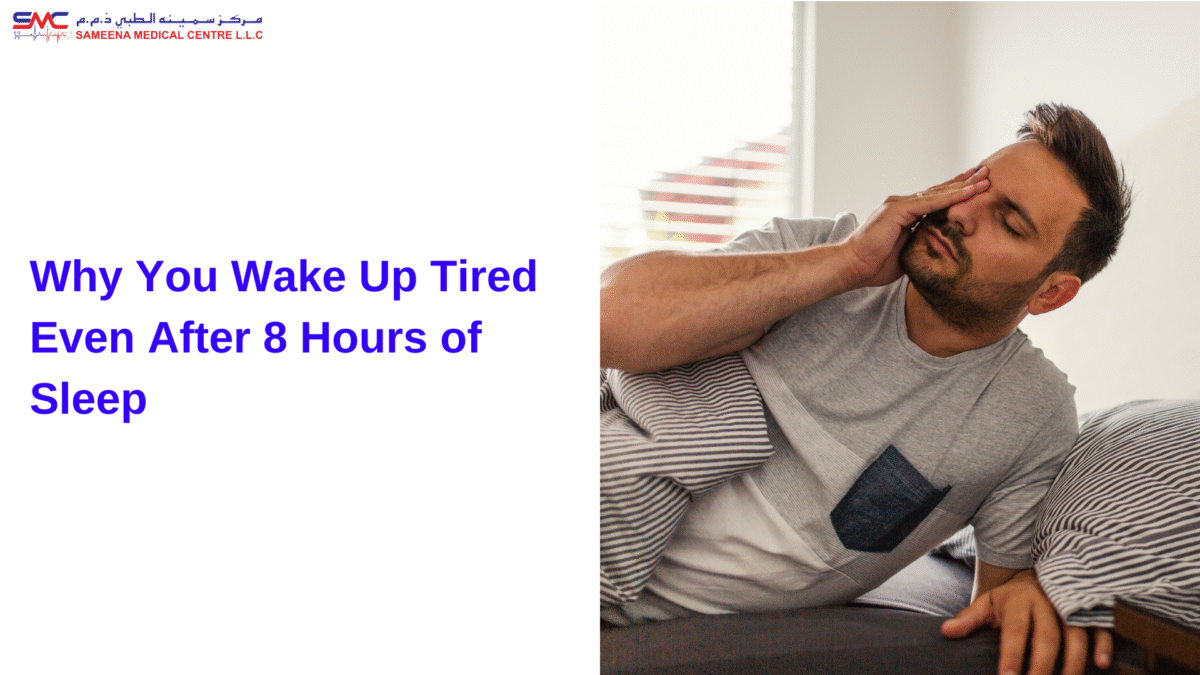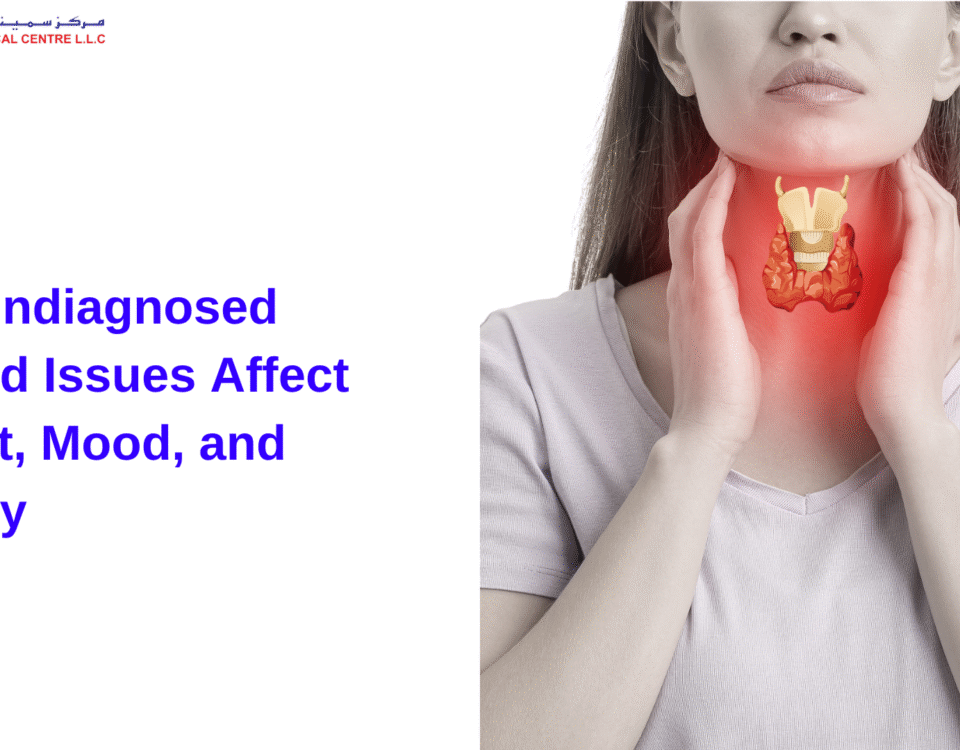
Hidden Signs of Chronic Allergies: Is It Just a Cold or Something More?
August 13, 2025Why You Wake Up Tired Even After 8 Hours of Sleep

Feeling drained even after a full night’s sleep is frustrating, and far more common than most people think. You did the right thing: got to bed on time, slept for a solid 8 hours, but still woke up groggy and slow. So what gives?
The truth is, sleep quantity and sleep quality are not the same. Your body needs more than hours in bed. It needs deep, uninterrupted, restorative sleep to function properly. If you’re waking up tired most mornings, your body might be telling you that something is interfering with how well you sleep.
This guide from Sameena Medical Centre explains the real reasons you may be waking up exhausted, and what to do about it.
Sleep Quantity vs. Sleep Quality
Understanding the Difference
Sleep quantity refers to the number of hours spent in bed, while sleep quality refers to how effective that time is for recovery. You can get 8 hours of poor-quality sleep and still feel worse than someone who slept well for 6.
How Sleep Quality Affects Your Energy
During sleep, your body cycles through light sleep, deep sleep, and REM sleep. These stages are essential for memory consolidation, tissue repair, and hormonal balance. Frequent disruptions in these cycles can prevent you from reaching the deeper stages, leaving you tired despite a full night in bed.
Common Reasons You Wake Up Tired
Waking up tired despite a full night’s sleep often points to deeper causes beyond the clock. From lifestyle habits and overlooked medical conditions to mental stress and environmental triggers, several factors could be affecting how well your body actually rests at night.
Poor Sleep Hygiene
Sleep hygiene involves the habits and routines that promote consistent, restful sleep. Inconsistent bedtimes, too much screen time before bed, or consuming caffeine late in the day can disrupt your circadian rhythm. These disruptions often lead to shallow, fragmented sleep that leaves you tired in the morning.
Sleep Disorders
Conditions like sleep apnea, restless leg syndrome, or chronic insomnia prevent your body from entering and staying in restorative sleep stages. Sleep apnea, for example, causes repeated pauses in breathing, which briefly wake you up throughout the night—often without you realizing it. These interruptions accumulate and lead to chronic fatigue.
Medical Conditions Affecting Energy
A variety of medical conditions can contribute to fatigue, even if you’re technically getting enough rest. Thyroid disorders, anemia, diabetes, and chronic fatigue syndrome are all known to interfere with how well the body recovers during sleep. When the body’s internal systems are imbalanced, sleep doesn’t offer the recharge it should.
Mental Health and Chronic Stress
Anxiety, depression, and high stress levels significantly impact sleep quality. Racing thoughts or elevated cortisol levels can make it difficult to fall into deep sleep, even if you’re unconscious. As a result, you might spend the night in light sleep or wake frequently, leading to mental fog and low energy the next day.
Nutritional Deficiencies
Micronutrients like magnesium, vitamin D, B12, and iron play crucial roles in sleep regulation and energy production. Deficiencies in any of these can cause symptoms such as low stamina, restless sleep, or difficulty falling asleep. Without the proper nutrients, your sleep cycles can be disrupted, and your energy won’t fully replenish.
Caffeine, Alcohol, and Hidden Stimulants
Caffeine has a half-life of about 5 to 6 hours, meaning it stays in your system long after that afternoon coffee. Alcohol may help you fall asleep faster, but it disrupts REM sleep later in the night. Hidden stimulants in medications or energy drinks can also delay sleep onset and reduce sleep quality without you even realizing it.
How to Start Feeling Better in the Morning: Top Tips
Stick to a Consistent Sleep Schedule
Your body thrives on routine. Going to bed and waking up at the same time each day helps regulate your internal clock. Even small variations—like sleeping in on weekends—can disrupt your circadian rhythm and lead to grogginess during the week.
Limit Caffeine and Alcohol Intake
Caffeine consumed after mid-afternoon can interfere with your ability to fall asleep and stay asleep. Similarly, alcohol may make you feel sleepy initially but disrupts your REM sleep, leading to poor-quality rest and tiredness in the morning.
Wind Down With a Screen-Free Routine
The blue light from phones, tablets, and TVs suppresses melatonin production—the hormone responsible for helping you fall asleep. Power down electronics at least 30 to 60 minutes before bed and consider reading or meditating instead.
Create an Optimal Sleep Environment
A dark, quiet, and cool room encourages better sleep. Use blackout curtains to block out light, a white noise machine to mask sounds, and set your thermostat to a comfortable cool temperature to promote deep sleep.
Exercise Regularly, but Not Too Late
Daily physical activity improves sleep quality by reducing stress and tiring the body naturally. However, avoid intense workouts in the evening as they can leave you feeling too energized to fall asleep easily.
Rule Out Underlying Health Issues
If lifestyle changes don’t improve your fatigue, a medical evaluation may be necessary. Conditions like sleep apnea, thyroid disorders, or nutrient deficiencies can rob you of energy, no matter how much you rest. Consulting a doctor can help pinpoint the issue and start the right treatment.
Conclusion
Feeling tired after 8 hours of sleep isn’t something you have to accept. Your sleep might be long but not restorative, and the causes could range from minor lifestyle factors to treatable medical issues.
At Sameena Medical Centre, we help you decode the message behind your fatigue and support you in reclaiming restful, energizing sleep. Don’t wait for exhaustion to become your norm.





